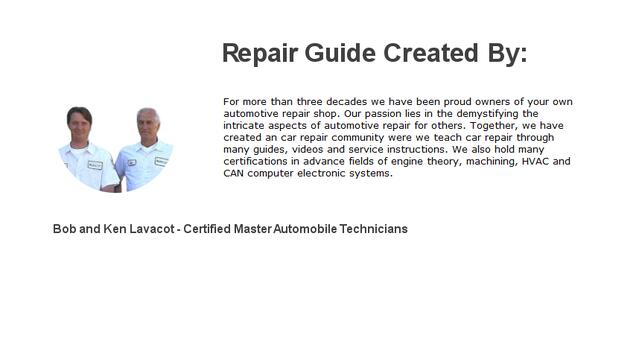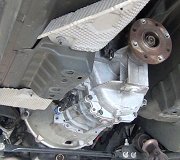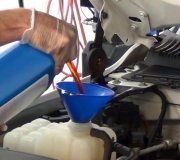The best way to avoid auto repair fraud is to be prepared, knowing how your vehicle works and to identify common problems is a start. It's also important to know how to select a good auto repair technician, what kinds of repair questions to ask, and your consumer rights to recourse of action. The Federal Trade Commission (FTC), the American Automobile Association (AAA), and the National Association of Attorneys General (NAAG), supply information about your automobiles that may help you keep auto repair mistakes to a minimum.
How to Choose Car Repair Facilities
-
Ask for recommendations from friends, family, and other people you trust. Look for an auto repair shop before you need one to avoid being rushed into a regretful decision.
-
Shop by telephone for the best prices, and compare warranty policies on all repairs.
-
Check for current licenses, local law requires repair shops to be licensed or registered. Also, the state Attorney General's office or local consumer protection agency (BBB) will record of complaints about a particular repair shop so check before you take your car for repairs.
-
Make sure the auto repair shop will honor your vehicle's extended warranty if you have one.
-
Check Google reviews and Yelp and other review sites for customer feedback.
Qualified Certified Repair Technicians
-
Look for shops that display various certifications, like an Automotive Service Excellence (ASE) seal. Certification indicates that some or all of the technicians meet basic standards of knowledge and competence in specific technical areas.
-
Ask if the mechanic or shop has experience working on the same make or model vehicle as yours.
Repair Charges: Understanding the Meaning
Before you agree to have any work performed, ask shop labor rate and the full price on parts and supplies, most shops charge a flat hourly rate for labor time. This published rate is based on an independent or manufacturer's estimate of the book time required to complete repairs. If you need complicated or expensive car repairs, or if you have any questions about recommended work, consider getting a second opinion from another vehicle repair facility or ask one of our experts.
Most shops have a diagnostic charge if you decide to have the work performed elsewhere, but if you decide to have the work done they will usually will roll the charge into the repair. If you decide to get the work completed, ask for a full written estimate.
Written Estimate
- Identify the problem to be repaired, the parts needed, and the anticipated labor charge.
- It should state that the shop will contact you for approval before doing any work exceeding a specified amount of time or money, state law will require this.
Replacement Parts Classification
- New - These parts generally are made to original manufacturer's specifications, either by the vehicle manufacturer or an independent company. Your state may require repair shops to tell you if non-original equipment will be used in the repair. Prices and quality of these parts vary.
- Remanufactured, rebuilt and reconditioned - These terms are not the same thing, reconditioned is basically a used part that has been painted, while rebuilt parts has been fully disenabled and the worn components replaced.
- Salvaged - These are used parts taken from another vehicle without alteration. Salvage parts may be the only source for certain older items, though their reliability is seldom guaranteed.
Picking Up Your Car
Get a completed repair order receipt describing the work done. It should list each repair, parts supplied, the cost of each part, labor charges, and the vehicle's odometer reading when you brought the vehicle and the warranty of the work that was done. Ask for the return of all replaced parts that were replaced, state laws require this.
Warranties
-
There is no "standard warranty" on car repairs. Make sure you understand what is covered under your warranty and get it in writing.
-
Be aware that warranties may be subject to limitations, including time, mileage, deductible and what businesses are authorized to perform warranty work or special procedures required to obtain reimbursement.
-
Check with the Federal Trade Commission or your state or local consumer protection agency for information about your warranty rights.
Service Contracts
Many vehicle dealers and others sell optional repair contracts which are issued by vehicle manufacturers or independent companies. Not all service contracts are the same; prices vary and usually are negotiable. To help decide whether to purchase a service contract, consider:
-
Contract annual cost.
-
The repairs to be covered.
-
Whether coverage overlaps coverage provided by any other warranty.
-
The deductible.
-
Where the repairs are to be performed.
-
Procedures required to file a claim, such as prior authorization for specific repairs or meeting required vehicle maintenance schedules.
-
Whether repair costs are paid directly by the company to the repair shop or whether you will have to pay first and then get reimbursed.
-
The reputation of the service contract company. Check Google Reviews or Yelp for any feedback that can help you make a decision.
Resolving a Dispute
-
Document all transactions as well as your experiences with dates, times, expenses, and the names of people you dealt with.
-
Talk to the shop manager or owner first. If that doesn't work, contact your Attorney General or local consumer protection agency for help. These offices may have information on alternative dispute resolution programs in your community. Another option is to file a claim in small claims court. You don't need an attorney to do this.
Auto repair is the number one service fraud in the country, so protect yourself and for more information, contact:
Bureau Of Automotive Repair 1-800- 952-5210
Autorepair.ca.gov - for California (substitute your state two letter abbreviation for the website in your area)
BBB - Better Business Bureau
Federal Trade Commission
Consumer Response Center
Washington, DC 20580
202-326-2222
TDD: 1-866-653-4261
The main office of your local American Automobile Association (AAA) motor club, listed under AAA in the telephone directory.
Your State Attorney General
Office of Consumer Protection
Your State Capital
Many Attorneys General have toll-free consumer hotlines. Check with your local directory assistance.
If further technical assistance is needed, our certified car repair technicians are ready to answer your car questions.
Credits
This guide knowledge base was created by the 2CarPros Team, and by Ken Lavacot: Automobile repair shop owner and certified master automobile technician of over 30 years. If you have question or need help please ask one of our experts we are happy to help. Please visit our 2CarPros YouTube Channel.



